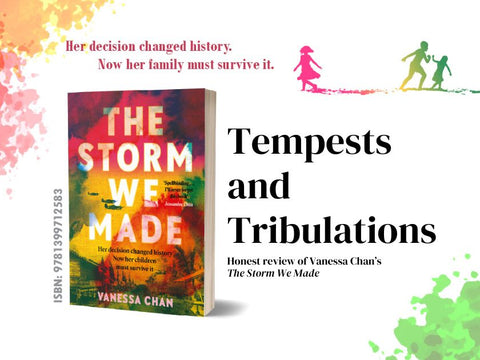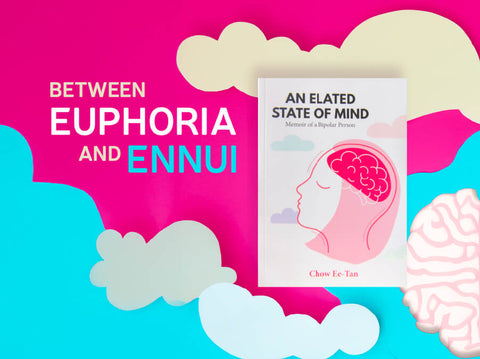*Not a spoiler-free review*
In Malaysian author Vanessa Chan's debut novel, The Storm We Made, the past catches up with Eurasian housewife Cecily Alcantara, who is lured into becoming a spy for Japan pre-World War II by Shigeru Fujiwara, a charismatic undercover Japanese military official.
In her espionage activities she finds an escape from the humdrum life of a mother and homemaker, a bigger purpose, and contact with Fujiwara, whom she grows attracted to. But when the Japanese arrive, they bring fear, deprivation and death to many. Cecily's heady dream of a better, British-free Malaya crumbles and her family and many others pay the price.
Her husband is conscripted as forced labour, while her son Abel is abducted and shipped off to the infamous Death Railway in Burma. Cecily's youngest child Jasmin is barred from leaving her family home, to hide her from roving Japanese patrols. Faring slightly better is her eldest child Jujube, who finds work at a tea house frequented by occupying troops and befriends a kindly Japanese teacher.
But Cecily is not only guilty of betraying the British...
Gritty, gut-wrenching
One puzzling thing about this supposed work of historical fiction is Fujiwara being introduced as the "Tiger of Malaya", a sobriquet given to a notorious historical figure. So one has to ask whether this, in spite of the consistency of the other elements, should be considered speculative fiction instead.
That aside, this wartime novel is a harrowing read, potent and uncompromising. The gritty and unpleasant are at times described in gut-wrenching detail. Despite the brisk pace of the narrative, the images burn into our minds with their intensity.
We suppress our queasiness as Cecily searches a garbage dump for scraps of information for her handler. We fear for little Jasmin as she naively wanders near a comfort station – a war brothel – while running after her newfound friend Yuki, an orphan and possibly a comfort girl. Our stomachs clench at the horrors Abel experiences in a labour camp. And the racism on display and the cattiness of society ladies' gossip gets under our nerves.
In real time, we see a family fall apart, the stresses from the Japanese occupation widening the cracks in the wholesome facade of the Alcantara family. The couple are hard to like, however. While her Eurasian mother brought her up to believe that Eurasians were also white and therefore superior, Cecily becomes disillusioned with this worldview after years of observing the Europeans around her. So she is chagrined to see her husband Gordon trying hard to be British to climb the social ladder.
Even so, when the Japanese arrive and terrible things happen, we still spare a shred of pity for the two – perhaps less for Cecily because her shared goal of Malaya's liberation with Fujiwara is overshadowed by her selfish desire to be part of something bigger than her dour self and middling role in life, and to be needed – desperately wanted, even – by a powerful albeit imperfect man.
Suffer the children
Sadly her children appear to have inherited that selfishness. With her family and life falling apart around her, Jujube finds little joy in her friendship with the Japanese teacher. The latter's anticipation of being reunited with his daughter begins to annoy her and awful thoughts start creeping in.
Angry and feeling betrayed at being locked up in the basement by Jujube who becomes furious and fearful upon learning of her escapades with Yuki, Jasmin runs away from home, ignorant of the dangers awaiting her. And despite the urgings of his campmate to be strong, buck up, and quit the drinking habit he picked up, Abel continuously drowns his sorrows with moonshine.
Nevertheless you turn the pages expectantly, heart teetering on a cliff-edge like an anxious parent searching for a lost child, looking for signs that their suffering will be over. Before we know it, we are near the book's end, breathless and spent. Such is the power of a gripping tale, relentless in showcasing the worst – and a bit of the best – in friendships, families, and communities.
People will be tested and they will eventually disappoint, more so when the fog of war obscures one's moral compass. "Being bad" is much easier when everyone around you is, for survival or to vent bottled-up negative thoughts and emotions. This story has no heroes, just ordinary people trying their best and failing under immense strain, making their rare triumphs shine all the more.
The characters are not perfect, but these imperfections – the racism, the tendency to dehumanise, and more – reflect the worst of ourselves and remind us to strive to be at our best and cherish what we have and hold dear. Because minds, lives, bonds, and ideals are fragile and can be easily broken in the storms of our own making.
This review is based on an advance reading copy. Get The Storm We Made here.





Comments (0)
There are no comments for this article. Be the first one to leave a message!